We recently visited the Twin Cities and discovered a marvelous green and open art space. We’re sharing the best of the sculpture garden in Minneapolis, adjacent to the Walker Art Center. Here’s our photo journey through the elegant modernity we found at this wonderful Minneapolis sculpture garden.
Elegant modernity at the Minneapolis sculpture garden
What could be more quintessentially American than a park in Minneapolis?
It’s situated in the middle of the country, in the Heartland, in a northern city home to icy cold winters and the hardy souls who embrace them. And yet, there’s something strongly reminiscent of Paris about the Minneapolis sculpture garden.
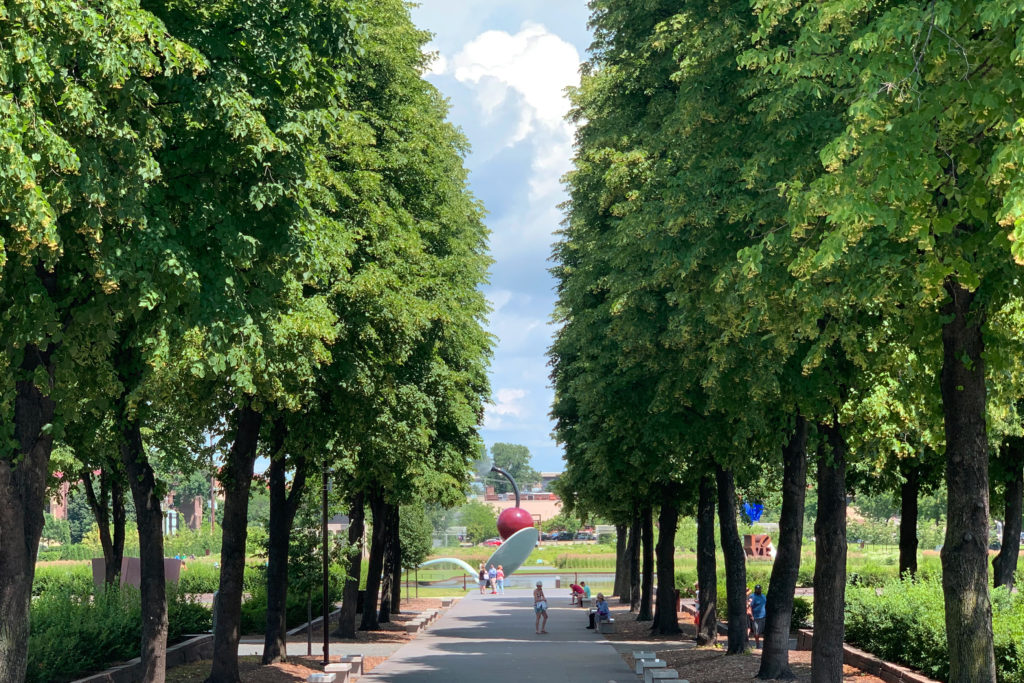
The Minneapolis Sculpture Garden. Photo Credit: Dandelion Chandelier.
If you’ve been to the Musée Rodin, you know what I mean. This is a pristine, elegant, serene, sophisticated green space, where works of art appear to spring organically from the earth below.
Magnificent allées of trees perfectly frame vistas that end with monumental structures and sculptures. The primary allée is lined with marble benches (more about them in a moment). The secondary and tertiary ones are graced by human-sized works of art. If you didn’t know better, you’d swear you were in Paris. And we mean that as an extremely high compliment, Minneapolis.
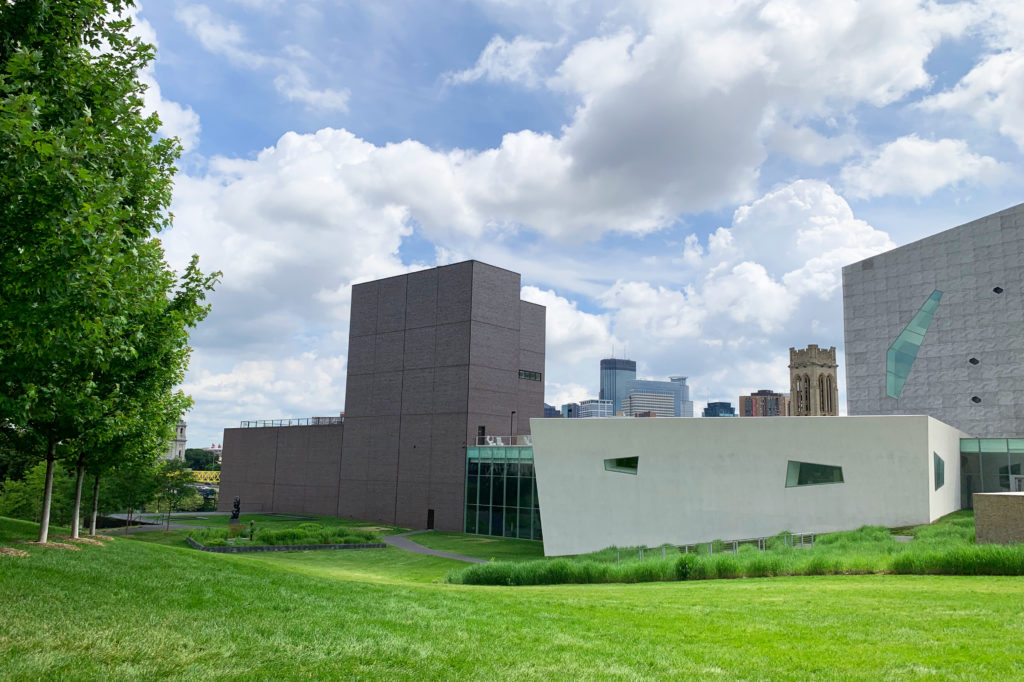
The Walker Art Center in Minneapolis. Photo Credit: Dandelion Chandelier.
A rich history and an interactive space
First opened in 1988, and fully reconstructed in 2017, the sculpture garden showcases works from the Walker Art Center’s collections of modern and contemporary art. This lovely verdant space is home to more than 40 outdoor sculptures. Artists from 10 different countries crafted these the works, many of which are site-specific.
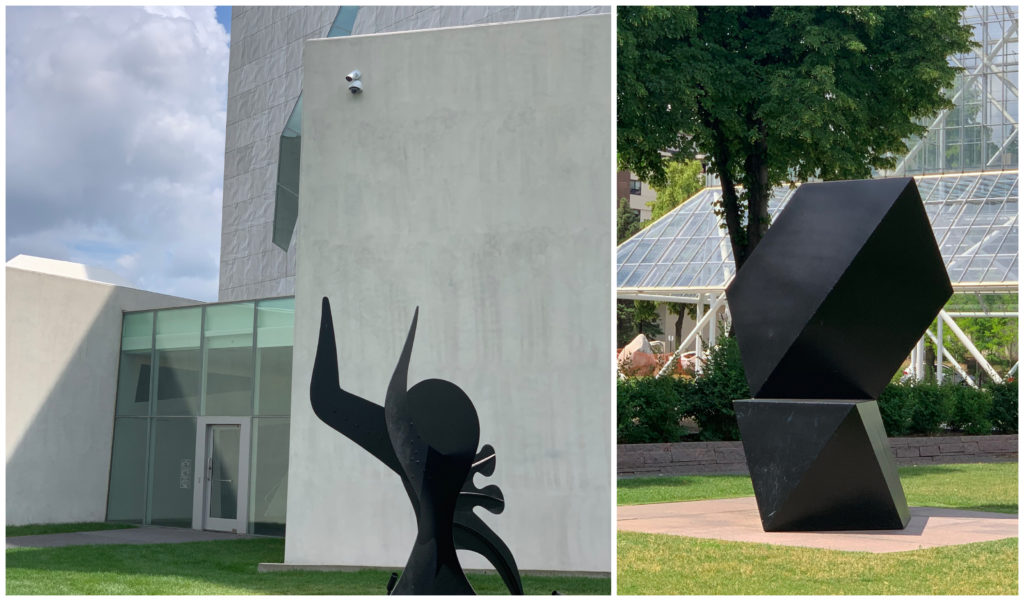
The Minneapolis Sculpture Garden. Photo Credit: Dandelion Chandelier.
We found it absolutely enchanting, and far more provocative than we expected.
The cliche is that the Midwestern temperament is stolid, sincere, and straightforward. We were pleasantly surprised by the whimsy, the wit, and the subversiveness of this garden. The museum describes it as filled with “spaces for gathering, conversation, or dreaming,” and that sounds right to us. We’d add wandering, imagining, listening and seeing.
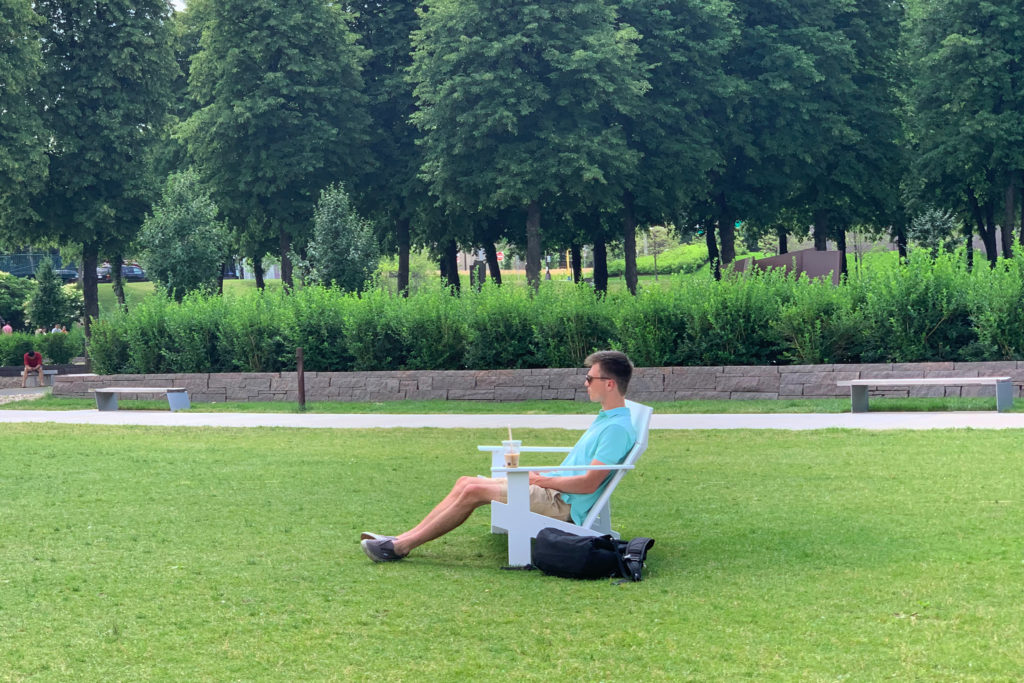
Minneapolis Sculpture Garden. Photo Credit: Dandelion Chandelier.
The garden is open 365 days a year, from 6:00A to 12 midnight each day. So the next time you’re in town, you have no excuse for not stopping by!
[white_box]Join our community
For access to insider ideas and information on the world of luxury, sign up for our Dandelion Chandelier newsletter. And see luxury in a new light.
sign up now >
[/white_box]
If you do visit the sculpture garden in Minneapolis, you won’t regret it. The garden rewards close observation, and quiet reflection. You can go solo or with a group. Either way, think of it as a marvelous outdoor treasure hunt, and you’ll have a splendid time.
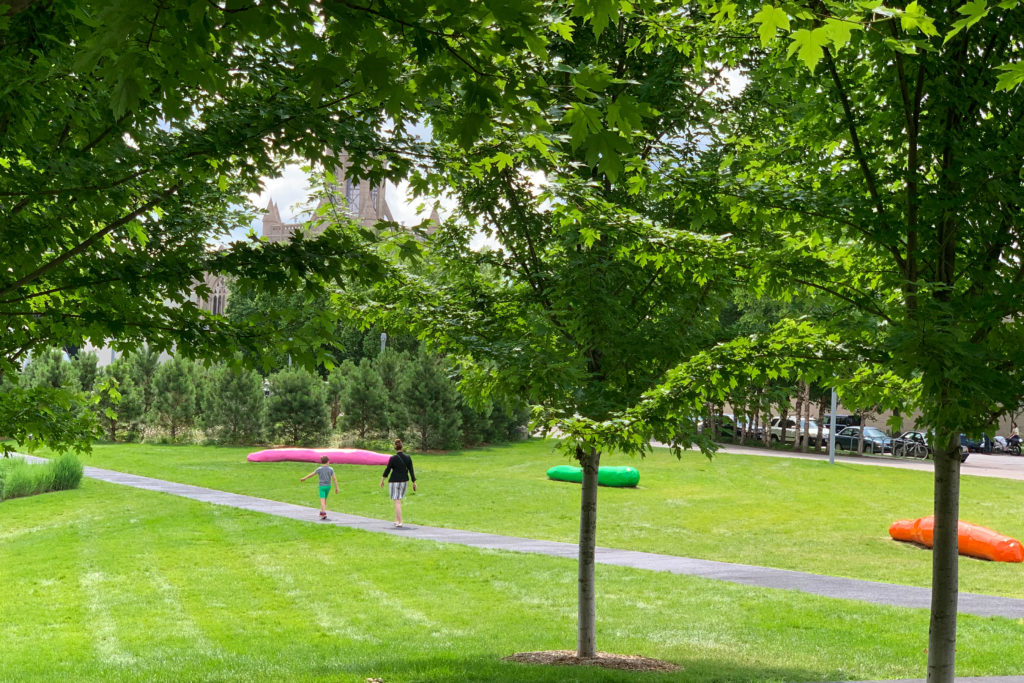
The Minneapolis Sculpture Garden. Photo Credit: Dandelion Chandelier.
The Best of the Sculpture Garden in Minneapolis
Here are the works – and clusters of works – that lingered in our minds long after our visit to the sculpture garden in Minneapolis was over. (We’re describing them with an assist from the Walker Art Center website).
1.The Iconic Spoon
The icon of this garden – and arguably of all of Minneapolis – is the famous “spoon sculpture.” Claes Oldenburg became a key voice in Pop Art, a 1960’s movement that saw many artists turning to advertising and consumer products for their subject matter. By the early 1980’s, Oldenburg had begun to make monumental outdoor works with Coosje van Bruggen, his wife and artistic partner. Spoonbridge and Cherry is one of their most celebrated collaborations.
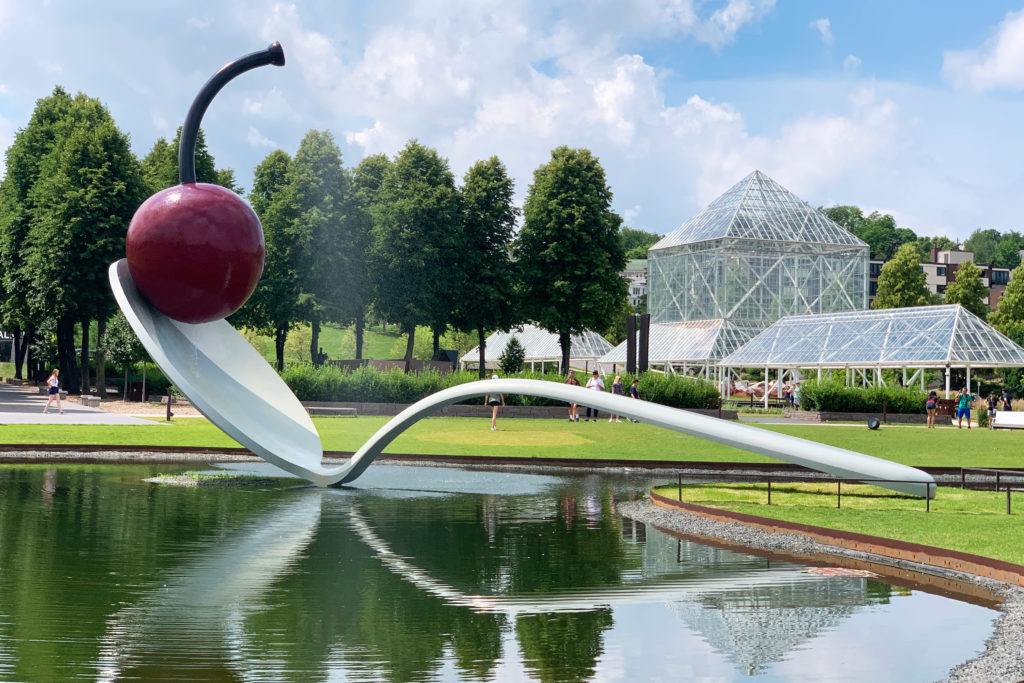
Spoonbridge and Cherry at the Minneapolis Sculpture Garden. Photo Credit: Dandelion Chandelier.
The fountain-sculpture was inspired by a novelty item Oldenburg had collected in 1962. It featured a spoon resting on an “island” of plastic chocolate. From this, the artists envisioned a gigantic utensil as a fanciful bridge over a pond. In homage to Minnesota, they conceived the spoon’s raised bowl as a nod to the prow of a Viking ship. Van Bruggen added the cherry, a personal symbol recalling happy moments from childhood.
There are Adirondack chairs scattered across the lawn surrounding this work, making it both a focal point for the garden and a lovely place to sit and reflect. You can chat with your companions, or even have a picnic. But you have to bring your own spoon.
[white_box]More in Contemporary Art
True New York: The Sculpture Garden at the MoMA
read more >
[/white_box]
2. The Heroic Rooster
The spoon and cherry may be the media darlings of this garden. But Katharina Fritsch’s magnificent blue rooster, entitled Hahn/Cock, has claimed permanent pride of place in our hearts. Made of fiberglass, polyester resin, and stainless steel, this sculpture is a delightful and slightly kooky recent addition to the park.
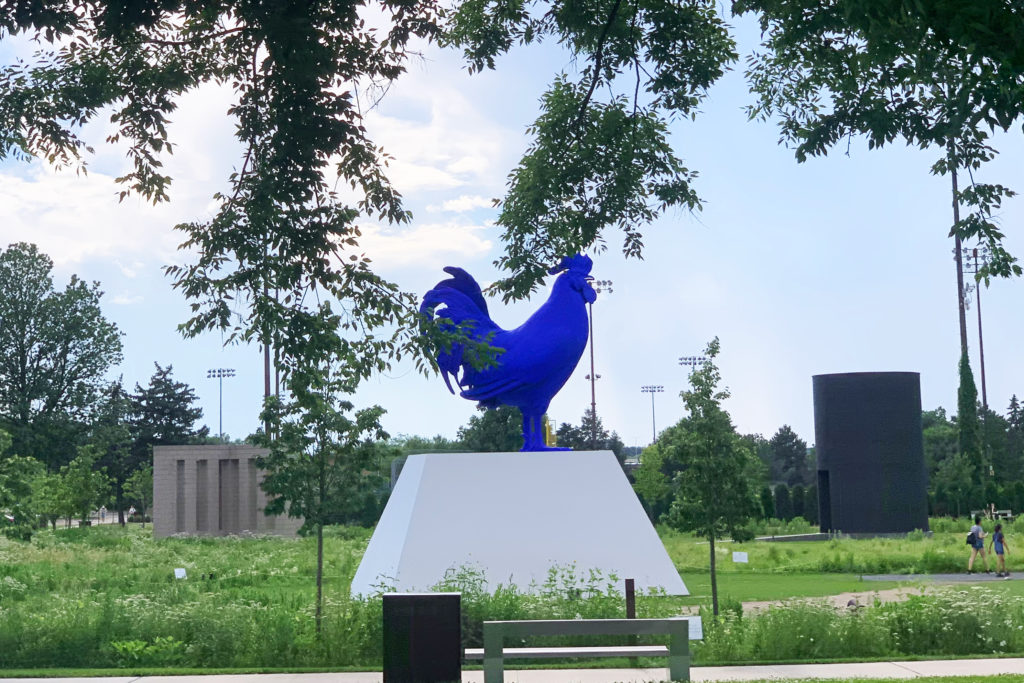
Minneapolis Sculpture Garden. Photo Credit: Dandelion Chandelier.
The combination of a humble domesticated animal like a rooster elevated to such monumental height – and colored in the most brilliant indigo hue – is priceless as a metaphor. And as a provocation. And as a reminder that quotidian objects can take on profound meaning if you examine them closely.
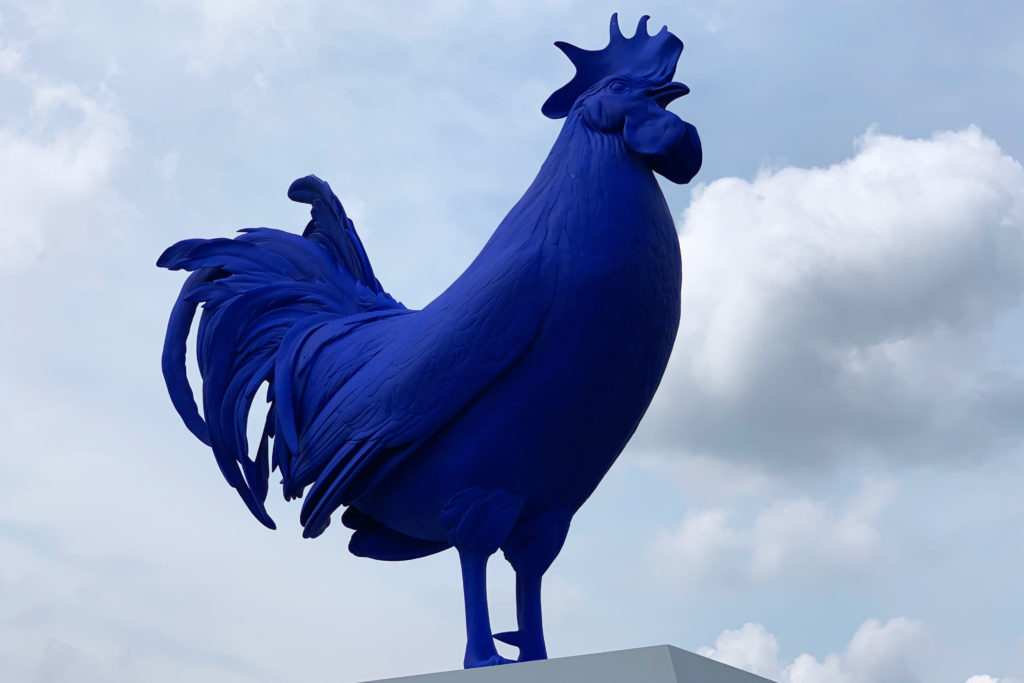
Minneapolis Sculpture Garden. Photo Credit: Dandelion Chandelier.
Roosters became a running theme in our visit to the Twin Cities, and we found more of them on display at the Minneapolis Institute of Art.
Upon reflection, we realized that roosters can symbolize all kinds of emotions and states of being. Pride, power, courage. Posturing and machismo. A cry of warning. A celebration of the dawn of something new.
We left town with a tee and a tote with this rooster’s visage on it, and we’ll be proudly sporting both in Manhattan. ‘Cause how many times in your life have your ever encountered a giant blue rooster? Attention must be paid.
3. The Giant Swing
Mark di Suvero’s Arikidea is composed of gigantic steel beams, balanced so that a touch or a passing breeze causes it to sway. There’s a wooden swing suspended from the center, and passersby often play on it. Lots of people did so with gusto the day we were there. Including one dad who almost did a face-plant, to the great delight of his family.
[white_box]More in Museums and Culture
True North at the New Nordic Museum in Seattle
read more >
[/white_box]
The sculpture’s title comes from the word “arachnid,” or spider—a creature admired by the artist for its ability to create complex, three-dimensional structures.
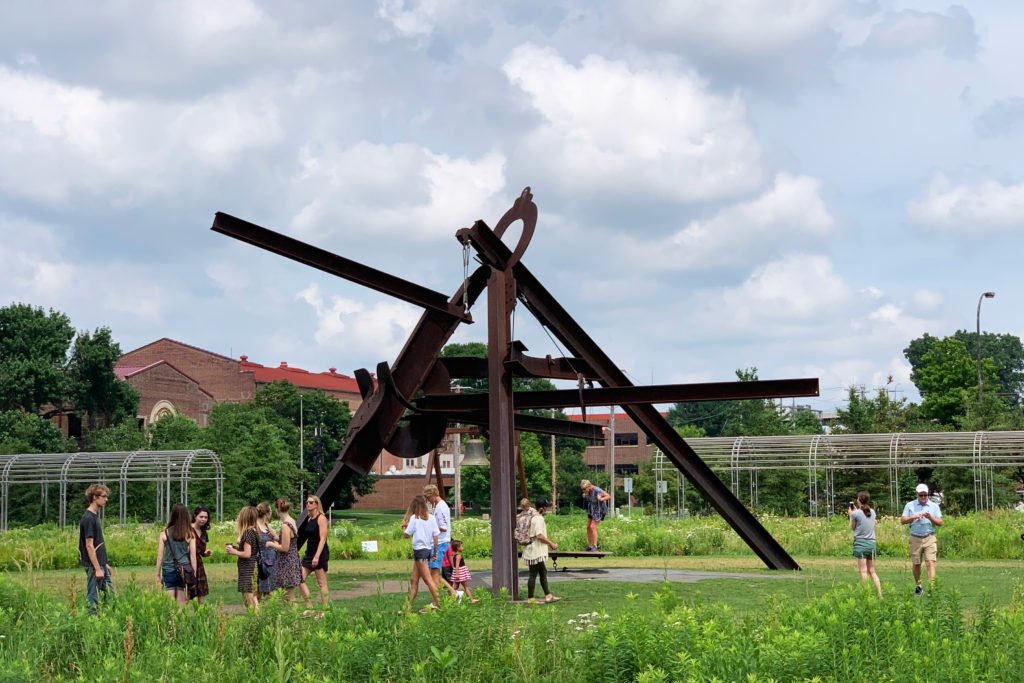
Minneapolis Sculpture Garden. Photo Credit: Dandelion Chandelier.
4. Love and Happiness
In the late 1950’s, Robert Indiana began making paintings and sculptures that featured words as the main visual subject. He has long been drawn to single, poetically powerful words.
We’ve seen several of Indiana’s “Love” statues in various places around the world, in different sizes and colors. The one in the Minneapolis sculpture park is made of painted steel. We absolutely loved (pun fully intended) the way this family decided to photograph it.
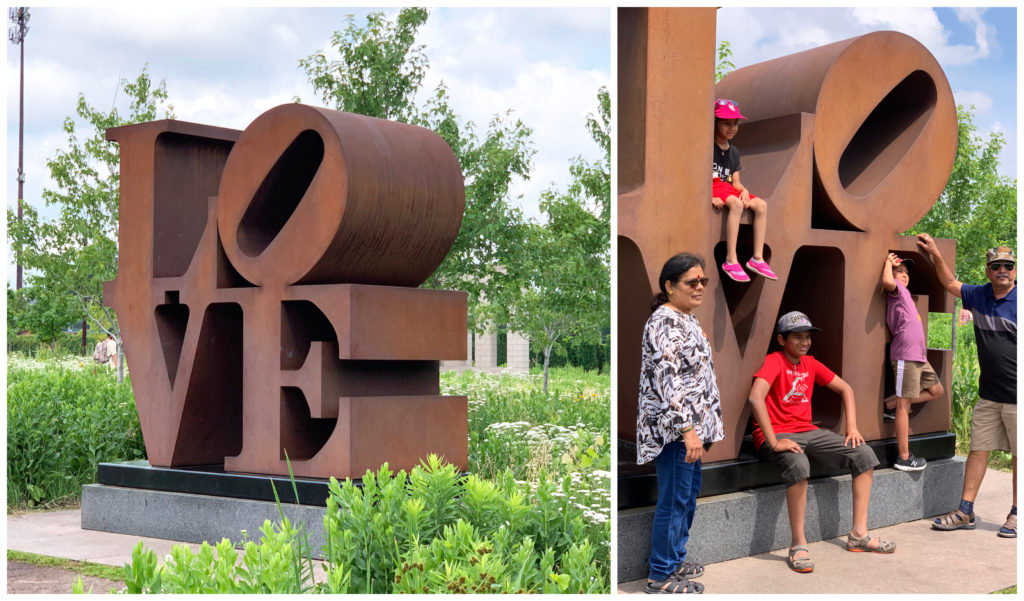
Minneapolis Sculpture Garden. Photo Credit: Dandelion Chandelier.
5. Benches that Speak
Jenny Holzer has been circulating her provocative messages—which she calls “truisms”—in public spaces since the 1970’s. The granite benches on view at the Minneapolis sculpture garden are from a large grouping of her works entitled The Living Series (1989).
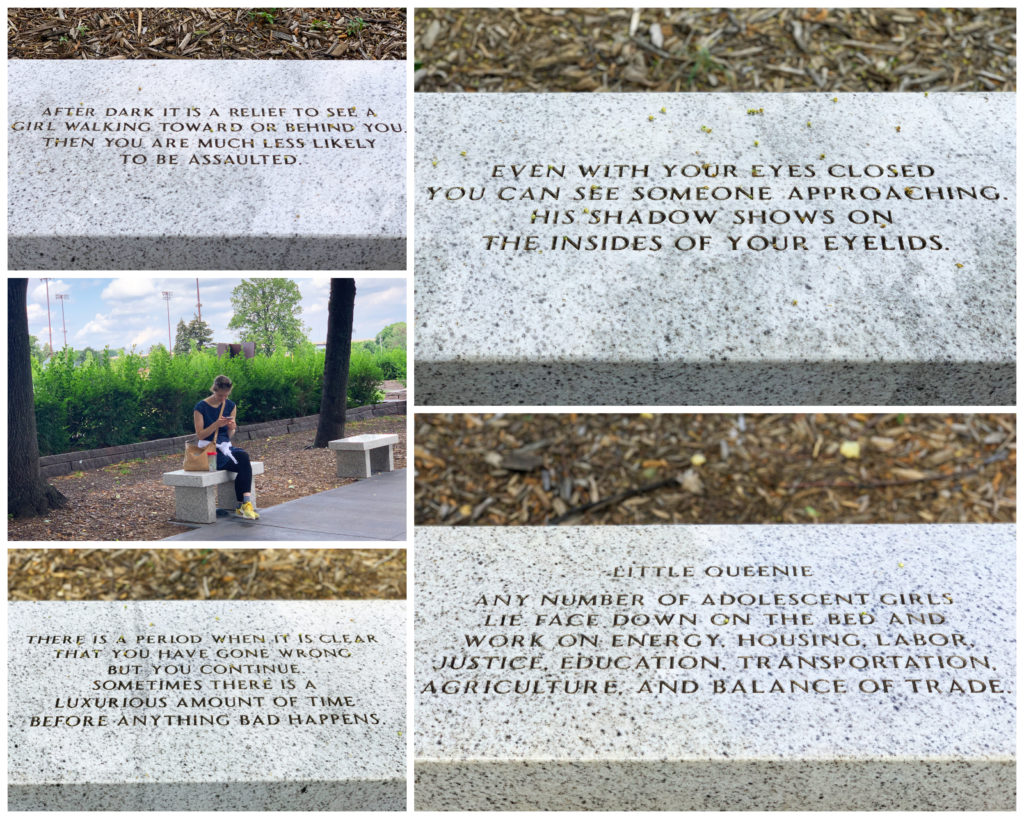
The Minneapolis Sculpture Garden. Photo Credit: Dandelion Chandelier.
6. Two Women
There’s a small tableau in a sheltered space that provokes thought about the role of women in society. And in narratives regarding strength and heroism. Thomas Schütte’s Bronze Woman IV is prone and curled up in a fetal position. She seems to be in a defensive posture. Or perhaps has already been defeated.
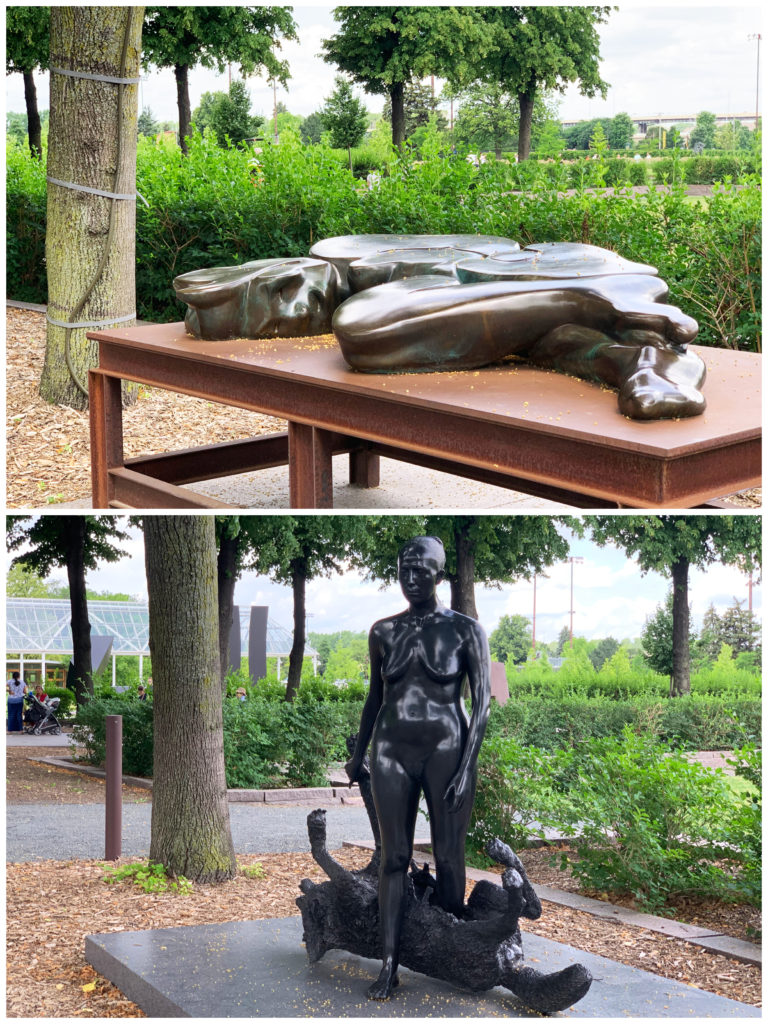
Works at the Minneapolis Sculpture Garden. Photo Credit; Dandelion Chandelier.
Nearby, though, is Rapture by Kiki Smith. In it, a woman appears to emerge from a slain wolf. The artist says that this work is in part her re-imagined ending to the tale of Little Red Riding Hood. She has noted that the work is also inspired by the life of Saint Geneviève, the patron saint of Paris, who was said to be able to calm both wolves and lambs.
A conquering female (crafted by a female artist), and a supine one (crafted by a man). A clever juxtaposition that should spark some interesting conversations.
7. A Gentle Giant
Another of our favorite works at the Minneapolis sculpture garden is a piece from Matthew Monahan. The artist creates sculptures that recall the symbols and relics of ancient civilizations. Standing 12 feet tall, Hephaestus (2013) portrays the Greek god of fire, metalworkers, and other craftspeople.
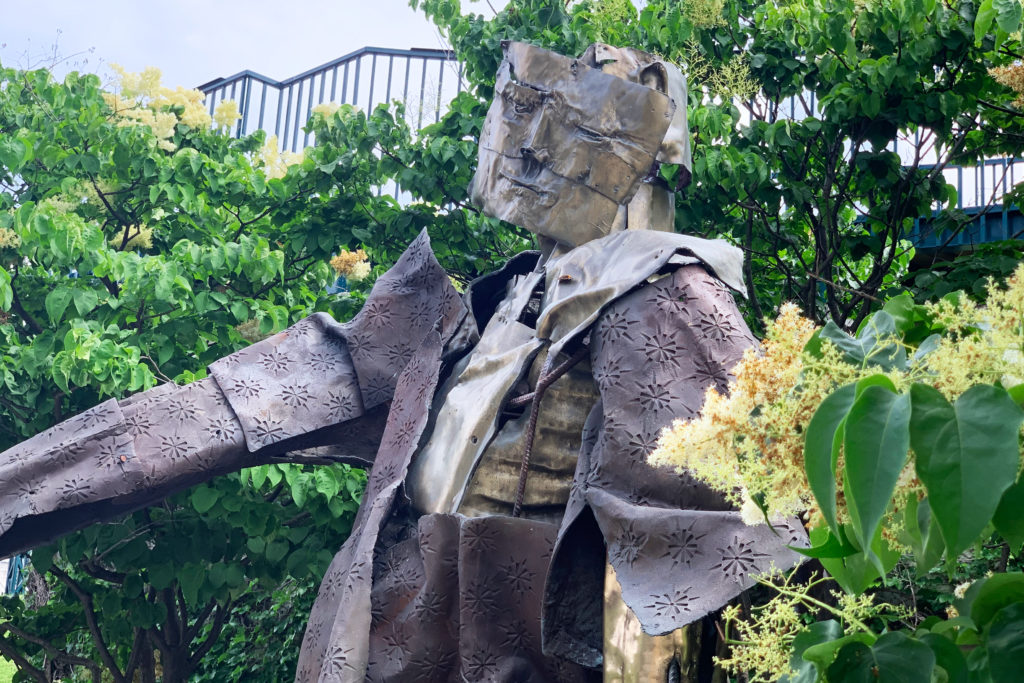
The Minneapolis Sculpture Garden. Photo Credit: Dandelion Chandelier.
We’re not sure why, but we found this particular work mesmerizing. The materials and their edges are cold, hard and sharp. But the facial expression, the outstretched arms, and the plentiful greenery and flowers are inviting, kind and warm.
The overall effect is that you’re being welcomed home. Or included in a special circle of friends. It was incredibly uplifting to stand quietly before this sculpture. That may be because of the times we’re living in – a time of walls and vitriol, fear and suspicion of the other. Whatever the reason, to think that something so different from us – a metal robot, really – could open its arms to us in such a benign, open and accepting way almost made us want to cry.
[white_box]More in Natural Beauty
how to experience the natural beauty of forest bathing
read more >
[/white_box]
8. Down to Earth
Near the Hephaestus statue is a series of human-scale works, one of which is done with such a sharp sense of humor that it made us laugh aloud.
Walking Man (1988), crafted by George Segal, is one of the few works that one can view nearly at eye level, which is refreshing after all of the monumental pieces. The artist placed the sculpture on a simple fragment of concrete sidewalk, rather than a traditional pedestal. He could easily be mistaken for a fellow visitor.
Tony Cragg’s Level Head evokes the rock formations found in the Western United States. But the artist adds a human touch to these features of the natural landscape. As the garden’s website notes: “wherever you stand when looking at this artwork, silhouettes of human faces emerge, resulting in profiles that twist and turn around a vertical axis.”
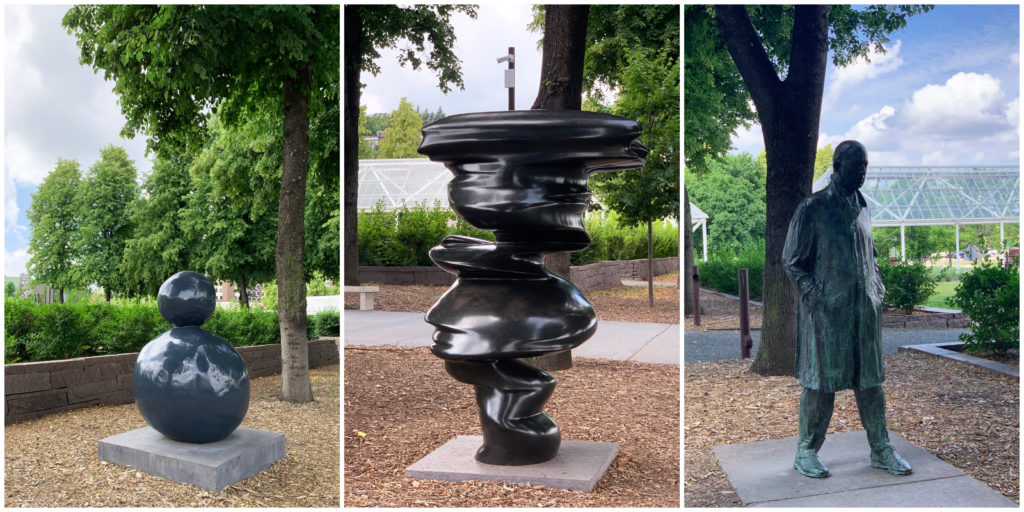
Minneapolis Sculpture Garden. Photo Credit: Dandelion Chandelier.
The best of all of these, in our humble opinion, is the last one. The work by Gary Hume is deceptively simple: two spheres, a small one on a large one. That’s it. We almost didn’t even walk over to view it, because it doesn’t look particularly interesting compared to what’s around it.
The sculpture is exactly the same no matter what side you view it from – there’s no front or back.
But when you come closer, you’re rewarded with the best joke in the garden (Spoiler alert: don’t read this if you want to be surprised). The piece is called Back of Snowman. Brilliant!
[white_box]More in Culture and Travel
the luxury of a magical evening at Butchart Gardens
read more >
[/white_box]
9. The Minnesota Twins
September Room (Room with Two Reclining Figures and Composition with Long Verticals) (2017) by Mark Manders combines female figures and architectural elements.
Three female profiles – two that appear identical and another that seems to be older than the other two – recall classical Greek sculpture. All three seem to be trapped between boards or beams. The title suggests a living space, and there are domestic items, such as a trio of chairs and a record player, as part of the piece.
A comment on a suffocating, constrained life of domesticity being experienced by these women? Perhaps. Discuss among yourselves.
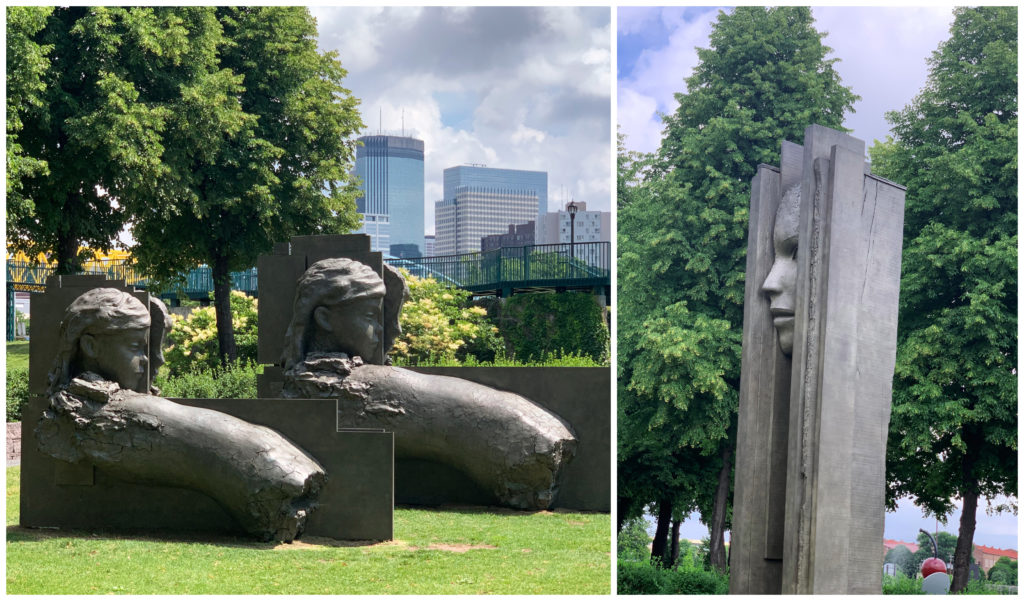
Minneapolis Sculpture Garden. Photo Credit: Dandelion Chandelier.
10. The Spider
When you first spot Empire by Eva Rothschild, you’ll think that it’s a homage to Louise Bourgeois’s Spiders. Or perhaps a child’s jungle gym, or something made of Legos.
But the artist has something quite different on her mind. The work’s mammoth archway meets the ground at 10 different points. Visitors can explore and experience the space around, beneath, and between its spindly “legs.” The title “Empire” suggests a great power, its vast reach enabled by its canopy-like silhouette.
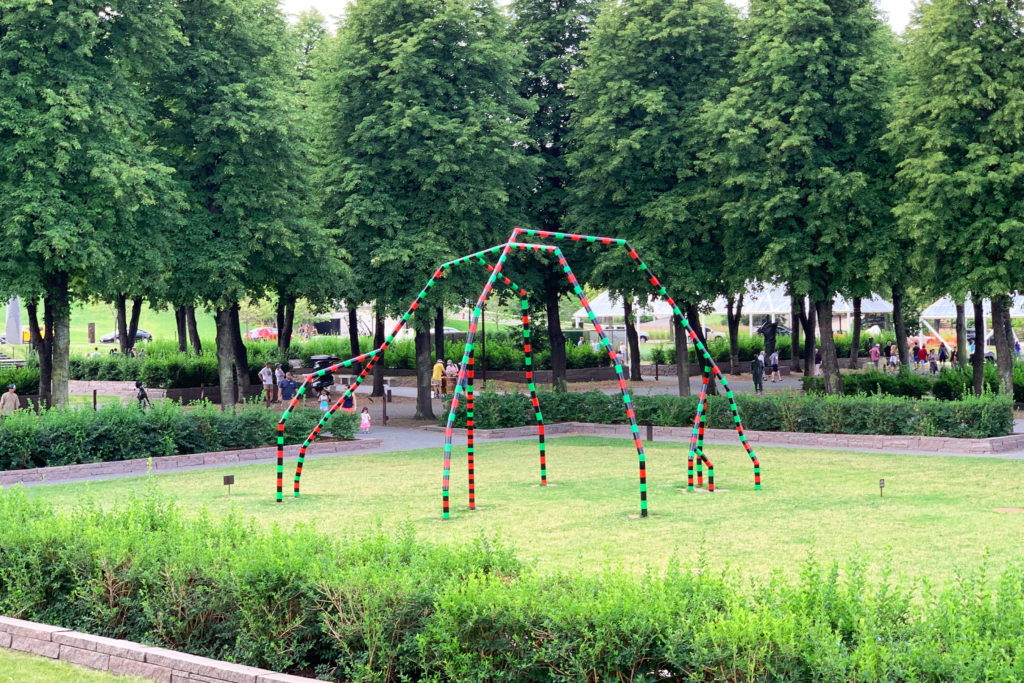
Minneapolis Sculpture Garden. Photo Credit: Dandelion Chandelier.
More in Contemporary Art
The Luxury of Being Lost in a Richard Serra Sculpture
read more >
[/white_box]
11. Metal and Glass
We wandered into a quiet space where sharp angles, graphic silhouettes, dark metal and brilliant glass reigned supreme. Double Curve (1988) by Ellsworth Kelly. Five Plates, Two Poles (1971) by Richard Serra. And Two-way Mirror Punched Steel Hedge Labyrinth by Dan Graham. All three works are sleek, slim and sharp. Which gives this neighborhood of the sculpture garden just a whiff of danger and a faint crackle of electricity.
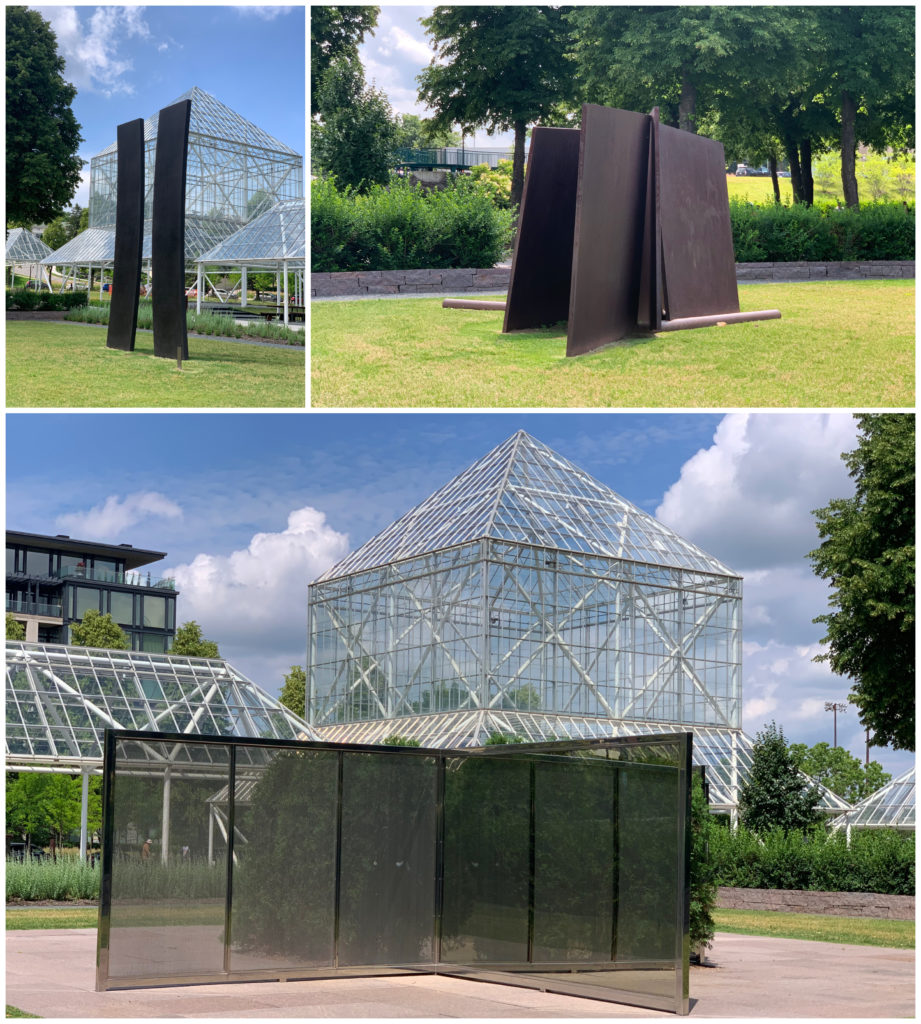
Minneapolis Sculpture Garden. Photo Credit: Dandelion Chandelier.
12. A Picnic Table
Positioned at the top of a hill in the Walker’s Wurtele Upper Garden, Scott Burton’s Seat-Leg Table is designed to be both a sculpture and a functional object. As a performance artist in the early 1970’s, Burton combined movement with ordinary furnishings, which he arranged onstage in place of actors. In later sculptures, he continued to explore everyday objects.
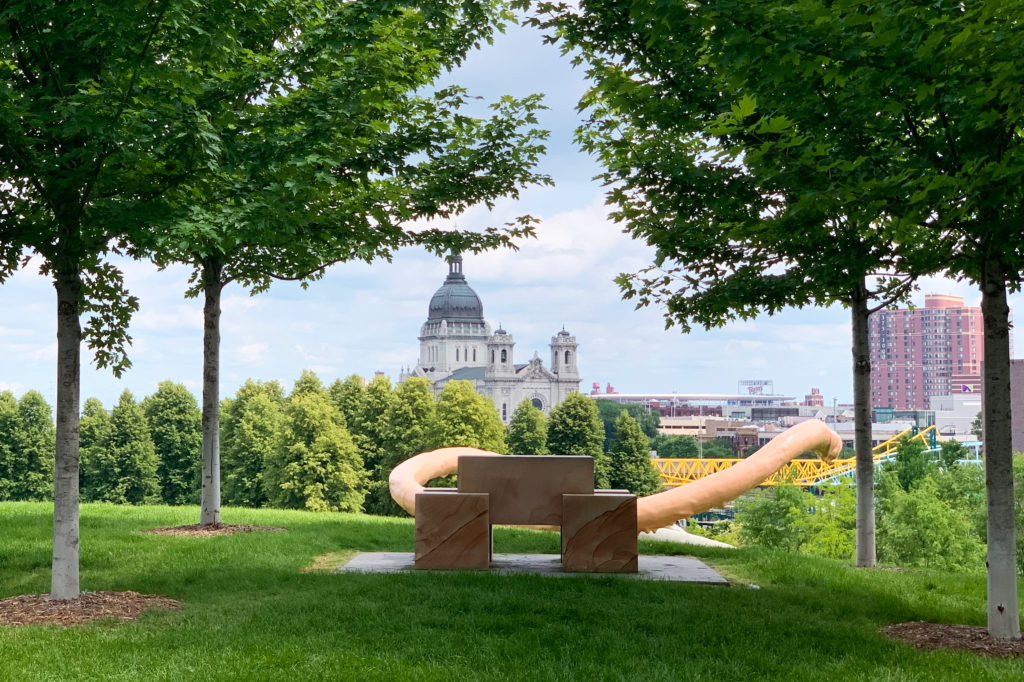
The Minneapolis Sculpture Garden. Photo Credit: Dandelion Chandelier.
This lovely shaded spot is a perfect place to sit and linger – and we saw two friends having lunch there as we crisscrossed the garden.
13. The Squiggles
Also in the Wurtele Upper Garden, scattered seemingly randomly across a verdant green lawn, are the whimsical components of Nairy Baghramian’s Privileged Points (2017). The trio of site-specific works are the artist’s exploration of ways to mark boundaries, transitions, and gaps in the museum.
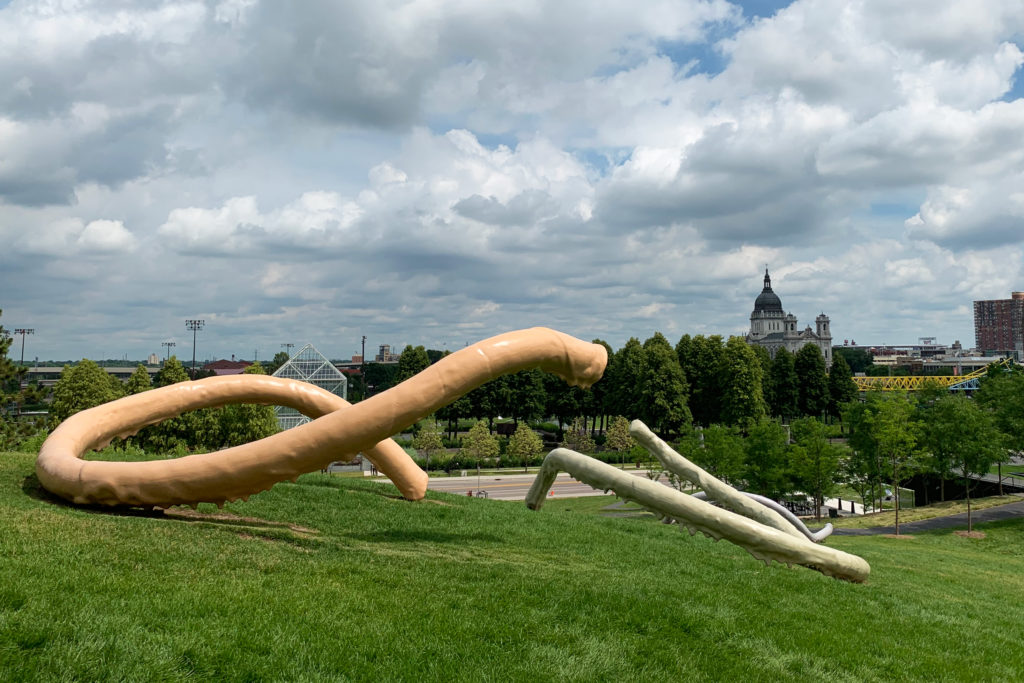
Minneapolis Sculpture Garden. Photo Credit: Dandelion Chandelier.
14. Shadows
Shadows at the Crossroads, a commission by Twin Cities–based artists Ta-coumba T. Aiken and Seitu Jones, is the newest addition to the Minneapolis Sculpture Garden. It’s a seven-part work. Each of the sculptures celebrates an important figure in Minnesota history, ranging from specific individuals to more general impressions.
Lines of verse are paired with many of the sculptures. We were particularly struck by Shadows at the Crossroads: Maḣpiya Wic̣aṡṭa (Cloud Man) (2019).

Shadows at the Crossroads: Maḣpiya Wic̣aṡṭa (Cloud Man) at the Minneapolis Sculpture Garden. Photo Credit: Dandelion Chandelier.
You can find similar works from the same artists just a few blocks away. Their series Shadows of Spirit (1992) is still in place in the sidewalks of Nicollet Mall (between 11th and Grant Streets). As the artists have described, “Shadows remind us that without light in our lives, the celebration of our existence is dimmed.”
15. The Bog Walker
The images on the deep black sculpture Bog Walker by Aaron Spangler —hands, tools, toys, and other symbols—are inspired by contemporary American culture, the Midwestern landscape, and natural phenomena. Beginning with a 1,400-pound block of wood planks, the artist shaped and marked the form. The bronze column is his first outdoor sculpture.
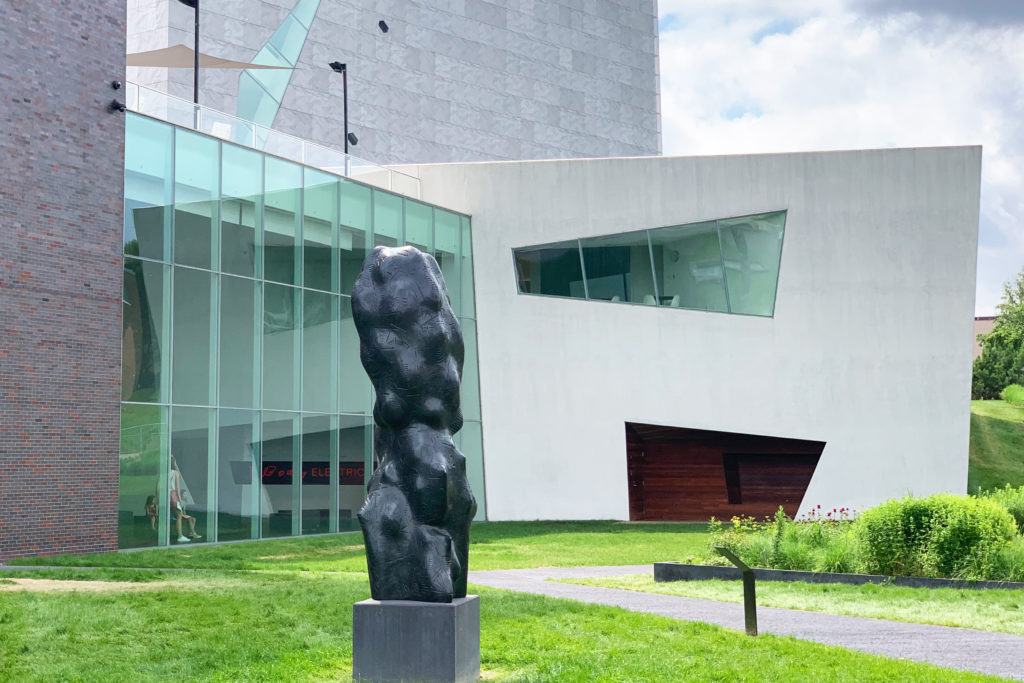
The Minneapolis Sculpture Garden. Photo Credit: Dandelion Chandelier.
16. Bench
Garden Seating, Reading, Thinking (1987/2017) by Kinji Akagawa is intended to invite private contemplative activities in a public setting. In subtle ways, it represents the heart of the region in which it sits. The work combines green basalt from Minnesota, a base of highly polished granite from South Dakota, and a slab of cedar that recalls forests from the region’s past.
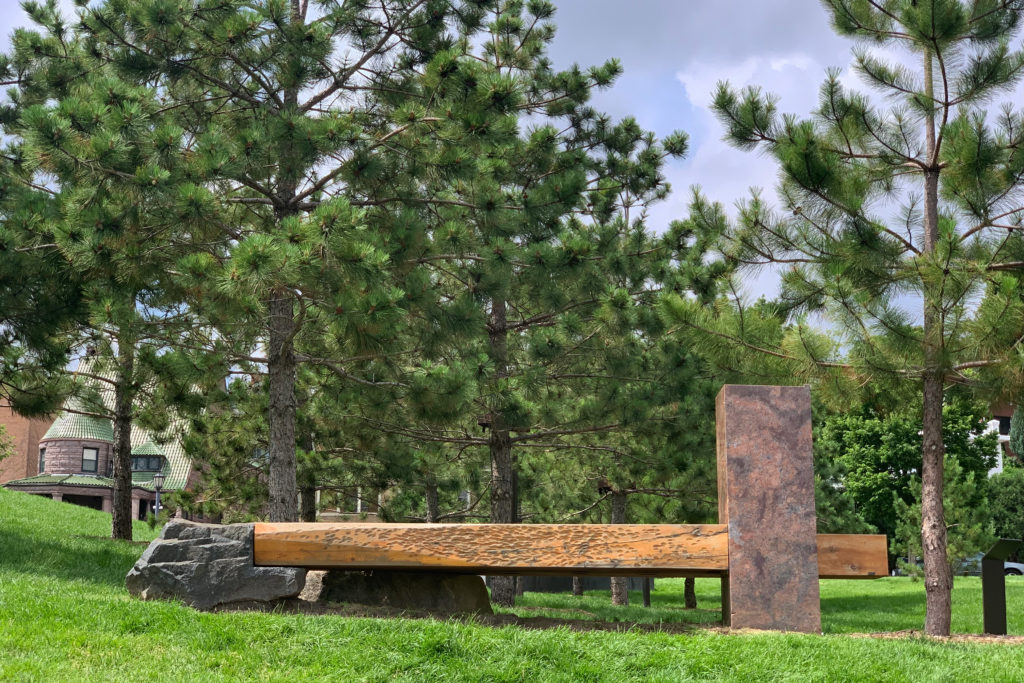
The Minneapolis Sculpture Garden. Photo Credit: Dandelion Chandelier.
a stimulating visit to the Minneapolis Sculpture Garden
Those are our top picks of what to be sure to see if you pay a visit to the sculpture garden in Minneapolis. We highly recommend it. Let us know what your favorite turns out to be!
join our community
For access to insider ideas and information on the world of luxury, sign up for our Dandelion Chandelier newsletter here. And see luxury in a new light.








